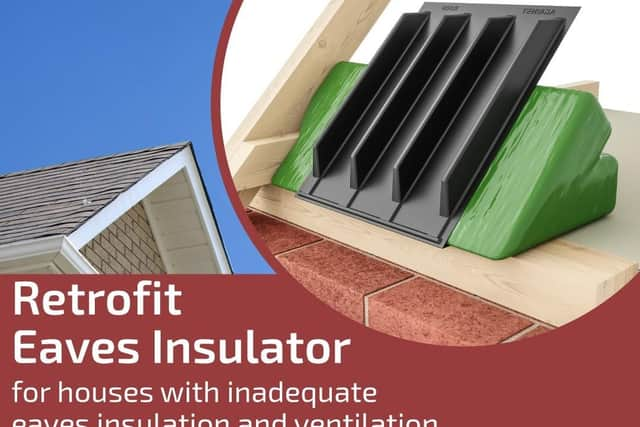Yorkshire invention to tackle mould and damp set to go on sale
Former Leeds Beckett University academics, Dr Matthew Brooke-Peat and Professor Christopher Gorse, who invented and patented the Retro Eaves Insulator, and a team from Leeds Beckett University and Leeds based ARC Building Solutions who have spent a number of years developing it, are good examples.
The small but mighty product they have produced is now ready to market. It is relatively inexpensive but highly effective and prevents cold spots in insulated roofs. (Sign up for our weekly Yorkshire Heritage newsletter)
Advertisement
Hide AdAdvertisement
Hide AdUnbeknown to many homeowners, cold spots in the loft are present in most properties built before 2002 and they have also been known to affect those built after this date.


Dr Jim Parker, Reader in the Leeds Sustainability Institute at Leeds Beckett University, says: “It was a problem that we identified through research at the university and it comes about because it is difficult to maintain a continuous layer of insulation at the eaves where the loft insulation joins the wall insulation as there is often a gap at that corner.
“So inside the home, in the rooms below the loft, you often get cold air filtering down, which leads to condensation and mould growth in areas where there are colder surface temperatures, including round windows and in bathrooms and kitchens.
“The Retro Eaves Insulator makes sure that there is no break in the loft insulation and therefore it helps prevent draughts, condensation and mould.”
Advertisement
Hide AdAdvertisement
Hide AdThe development of the product, set to go on sale, was helped by Innovate UK, Britain’s national innovation agency, which part-funded a collaboration between Leeds based ARC, a specialist manufacturer of cavity fire barriers and cavity closers, and Leeds Beckett University.
The two-year Knowledge Transfer Partnership, saw the KTP associate and now Product and Innovation Manager at ARC, Alex Boote facilitate the collaboration and establish a New Product Development capability section, which has helped further develop, test and launch the Retro Eaves Insulator.
When it hits the market, its main use will be in lofts but it can also be used when insulating external walls, though the latter are far less common due to their much higher cost.
Initially it will be available to trade customers, including house builders and loft installers, but ARC is also looking at how it might retail the product.
Advertisement
Hide AdAdvertisement
Hide AdPredicted costs to retrofit the average loft with the Retro Eaves Insulator looks set to be about £300, which ARC say is a relatively small outlay when considering the mould issues it tackles. (
Housing associations could be one of the biggest spenders when the new invention goes on sale.
This is due to Awaab’s law introduced after the death of Awaab Ishak, aged two, who died from a respiratory condition caused by exposure to mould at his parents’ social rented home in Rochdale.
As a result all social housing landlords have to investigate and and fix reported health hazards within set timeframes.
Advertisement
Hide AdAdvertisement
Hide AdDr Parker says: “It’s awesome to see our research manifest into reality and reach the manufacturing stage. The Retro Eaves Insulator should have a big impact, from a health aspect as damp and mould is so bad for our health.
“Delivering practical, applied research solutions is central to the Leeds Sustainability Institute’s success and working with ARC on this project was a natural progression for over a decade’s worth of in-depth investigations.
“The Knowledge Transfer Partnership has seen deep academic understanding of damp and mould growth at building junctions manifest in a real-world market-ready solution that can help to minimise cold-bridging in vulnerable spaces, in homes that are in the most need.”
The collaboration between the university and ARC also saw another invention. The TCB Square restricts the spread of smoke and flames in an internal wall cavity. This is set to go on sale and there could be more to come as the university also has a patent on another insulation invention.
Advertisement
Hide AdAdvertisement
Hide AdNeil Weeks, MD of ARC Building Solutions, says: “This has been a brilliant process to bring academic thinking into the commercial world with great success. We look forward to planning another Knowledge Transfer Partnership with Leeds Beckett and building on the progress so far.”